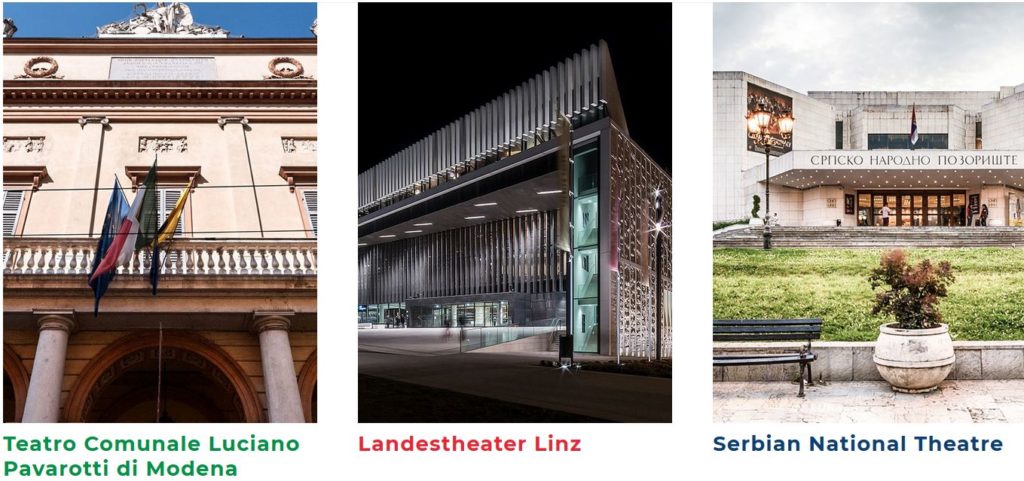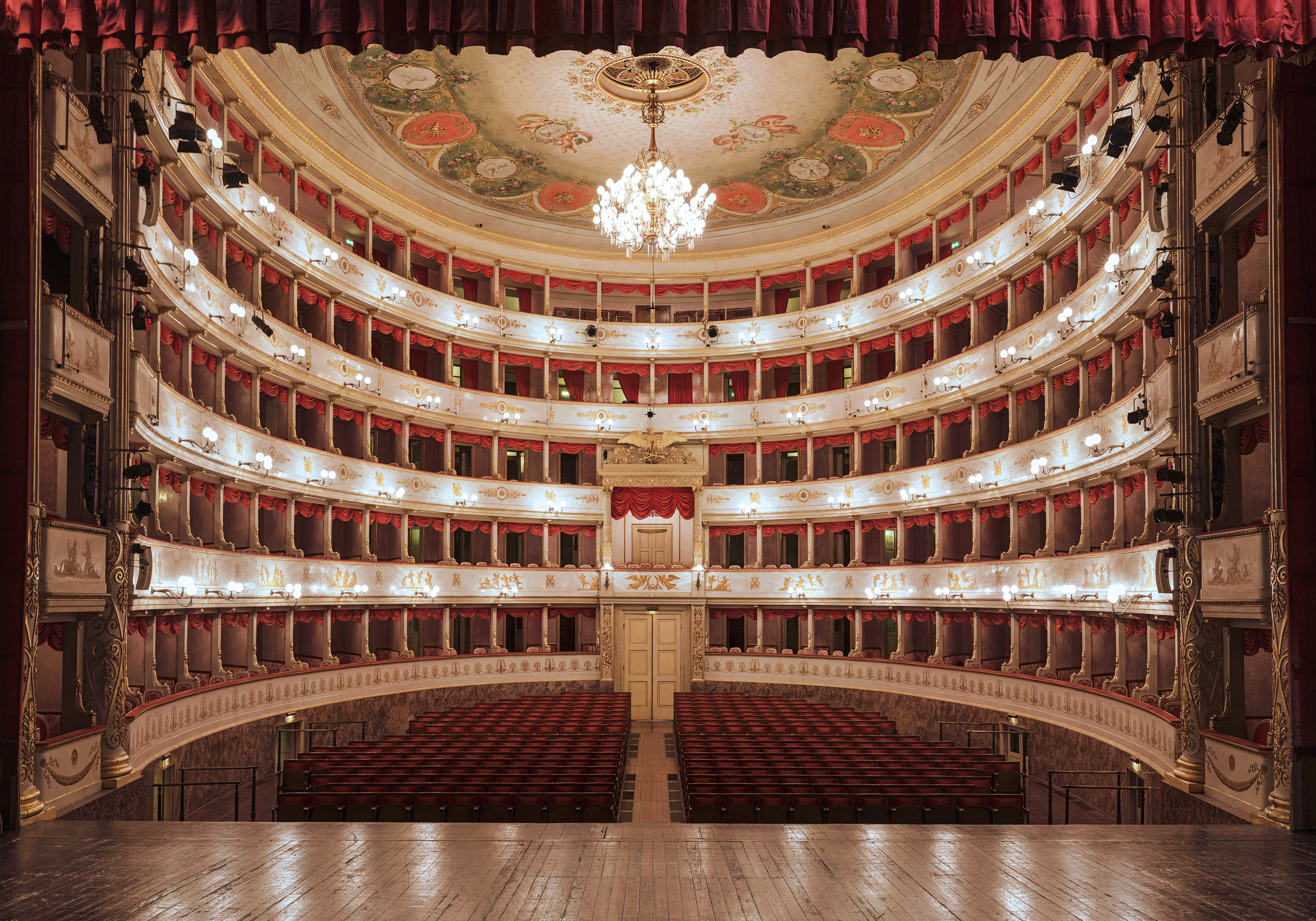LIVE STREAMING
December 5, 2021 h 3:30 pm CET
CROSSOPERA
OTHERNESS, FEAR AND DISCOVERY
Streaming Live 5 December 2021, 3:30 pm CET
Opera in three parts
Dream, music and lyrics by Jasmina Mitrušić
Flight to Egypt, music Valentin Ruckebier, libretto Hermann Schneider
What do you know about the futur? music Luigi Cinque, libretto Sandro Cappelletto
Narrator Sandro Cappelletto
Soprano Evgenija Jeremić
Mezzosoprano Idil Karabulut
Alto Dalila Djenic
Tenor Florian Wugk
Bariton Eugenio Maria Degiacomi
Bass Strahinja Đokić
Director Gregor Horres
Conductor Đorđe Pavlović
Set and costume Mariangela Mazzeo
Drammaturg Katharina John
Ensemble CrossOpera: Modena, Linz, Novi Sad
New opera commissioned and produced by Fondazione Teatro Comunale di Modena, Landestheater Linz, Serbian National Theatre
Cofunded by Creative Europe

CrossOpera Otherness: fear and discovery, is a project winner of EU Creative Europe program cooperation grant 2017. The project joints 3 opera theatres from 3 different countries: Teatro Comunale di Modena (Italy), Landestheater Linz (Austria) and Serbian National Theater from Novi Sad (Serbia). Both Linz and Novi Sad are Modena twin cities. The main action of the project is to co-produce a new opera whose 3 acts will develop short stories commissioned to 3 different composers representing each country. All composers will work on the same given subject: “Otherness: fear and discovery”, sensitive to intercultural clash and integration. The subject of the work will develop three different stories concerning the recent immigration towards the countries of the European Union.

CrossOpera started with the commission of the 3 acts opera to the Serbian composer Jasmina Mitrusic, the Italian Luigi Cinque and the German Valentin Ruckebier. The priority of the project is the transnational mobility of artists and musicians. A travelling artistic team made of singers and musicians will follow a week of music rehearsals of each act in every theatre (‘Austrian’ act in Linz, ‘Serbian’ act in Novi Sad, ‘Italian’ act in Modena) with the guide and supervision of the local composer. The staging of the opera will start in Modena, where a last round of music rehearsal and the stage rehearsals of the whole opera will be followed by the première of the show. Following Modena, the opera production with the whole team will travel to the Landestheater Linz and the Serbian National Theater in Novi Sad. The opera will go on stage on May 2020.
The opera will be sung in the local language of every act, Serbian, German and Italian while supertitles will translate the opera in the language where it is performed. The vocal cast, 6 singers, two per each nationality, will remain the same in all performances and will all sing in three languages. The singers will take advantage of the 3 vocal coaches provided one by each theatre to learn their parts in a foreign accent.
Following the Creative Europe guidelines, the project encourages the transnational mobility of artists and professionals, as well as the transnational circulation of cultural and creative works, the aim of which is to promote cultural exchanges, intercultural and interfaith dialogue, understanding for cultural diversity and social inclusion. Cross-border and mobility strategy is as well aimed at capacity building for cultural operators involved in the project to work transnationally and internationally. Reaching new and wider audiences and triggering intercultural and interfaith dialogue, respect for diverse cultures and cultural expressions, and facilitating the integration of refugees are also CrossOpera priorities to meet Creative Europe perspectives.
Although the translational production of the opera will be at the core of the project, the activities radiating from the main task aim to fulfill a number of subjects of particular interest for the European cultural program. All of them will help to enhance and develop the identity, the cultural awareness and the vision of the partners and its audiences at a European Union level, well beyond local and national levels. Actions during the stays in the three different countries will include training and activities in audience development and interaction with local communities, including efforts to reach usually under-represented groups such as refugees.
DREAM (SAN)
Opera in one act. Text and music by Jasmina Mitrušić
A bus stop in the dreary nowhere, somewhere in southern Serbia. Three women, mother,
daughter and the staff of a refugee center. The mother is sick and afraid of dying in a
foreign country. She longs for her family, which she fears never to see again. Three male
refugees from Afghanistan, two of them teenagers. Waiting as well they sit down
exhausted on the bench next to the sleeping women. They have nothing to fear from them.
Experiences of violence and escape made them tired. Sleep overwhelms them. A shared
dream strikes all six. In the dream it becomes possible what reality denies: the hopeless
meet each other and recognize familiar faces in one another. The overcome fear
unleashes the healing of their tortured souls. The regained respect towards life allows
hope to rise. The sound of an engine wakes them up. The dream fades but is still present.
A miracle has occurred. Hope and strength flood the souls of those who were still
desperate yesterday. Their shared dream allows the guards to become a human family
together. Each one goes his own way upright and full of confidence.
THE FLIGHT TO EGYPT
Opera in one act by Valentin Ruckebier, text by Hermann Schneider
A couple of refugees has reached a hospital. Their toddler was taken to an adjoining room.
A doctor, his assistant and a nurse question the asylum seekers about the circumstances
of their escape. Communication turns out to be extremely difficult. The experiences
reported by the couple reach the limits of what is tangible and explainable.
The father explains that the ruler of their homeland ordered all newborn children to be
killed up to the age of two. That night a stranger stood next to her bed and asked them to
flee to Egypt immediately. Three other children join them on their escape. A miracle
happens. Attacking dragons can be stopped by the couple’s small child and pay homage
to him. Lions and panthers also become peaceful companions of the refugees through the
desert.
The woman is hungry and exhausted. She dreams of a miracle. The man tells of the
unbearable heat on the run, which would have robbed them of any feeling of time. When
they arrived at a so–called “Capitol”, all pictures and statues would have been destroyed. A
man tried again to get her child, but the family could have saved themselves to the
hospital.
An immense shock strikes everyone.
E TU, CHE SAI TU DEL FUTURO?
Opera in 14 scenes by Luigi Cinque, text by Sandro Cappelletto
Friedrich Schiller’s Ode to Joy is the starting point for Sandro Capulletto’s reflection on the
question of the prerequisites for unlimited human solidarity beyond all historical lines of
conflict. Nevertheless, future projects in terms of humanity do not take place in a
historically underscribed space. In his oratorio like opera he looks for points of contact,
ideas and hints on how things could go on and which historical mistakes and influences we
have to overcome in order to anchor the principles of “brotherhood” in our world.
Cappelletto builds on his own experiences, encounters and memories in connection with
trips to African countries. He confronts us with the ravages of the colonial past, with
European racism and fascism, but also with the utopias of African thinkers such as the
Nobel Peace Prize laureate Nelson Mandela or Thomas Sankara, the courageous
President of Burkina Faso, who envisaged the future of Africa by creating an independent,
self–confident and independent identity of the continent itself. Beyond ethnic, cultural and
national issues, he encounters an important instrument, the application of which is an
essential prerequisite for the realization of a world society with equal rights: the full
realization of equality between men and women.
LIVE FROM

TEATRO COMUNALE DI MODENA
The Luciano Pavarotti Opera House which opened in 1841, still preserves its beauty and original appeal. Its acoustic excellence and elegant architecture contribute to making it one of the most renown opera houses in Italy and a must for lovers of opera, dance and music the world over.
From its opening until today, the Opera has hosted the performances of the greatest artists. They have contributed to forging its prestigious musical tradition, acclaimed throughout the world. In 1955, the young Mirella Freni debuted on stage as Micaela in Bizet’s Carmen, together with Luciano Pavarotti who played one of his first roles in the Bohéme. From 2008, after the death of the great tenor, the Opera was renamed after him.
The artistic programming of the Pavarotti Opera House has also evolved through its opening up to new musical and visual languages. It gives space to innovative directors, young singers, emerging choreographers, as well as hybrid musical experiences that move across genres.

Media partner

OperaStreaming
Project coordinator
Fondazione Teatro Comunale di Modena
Via del Teatro 8 - 41121 Modena
P.IVA e CF 02757090366
info@teatrocomunalemodena.it
Tel. 059 - 2033020


